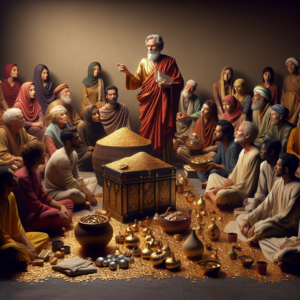Introduction: A Tale of Transformation and Redemption
On the surface, Anthony Burgess’s A Clockwork Orange, and its 1971 film adaptation by Stanley Kubrick, present a dystopian nightmare of violence and dehumanization. However, by delving deeper into the psychological and spiritual journey of its protagonist, Alex, a compelling parallel emerges between his story and the transformative power of grace and redemption found in the Bible. This devotional aims to illuminate the shadows of A Clockwork Orange with the hopeful light of biblical principles.
Divine Grace Amidst Human Depravity
The world of A Clockwork Orange is steeped in violence and moral decay, not unlike the depraved societies described in the Bible before divine intervention. Alex, the protagonist, epitomizes this depravity with his enthusiasm for “ultraviolence.” However, his journey mirrors the biblical narrative of the prodigal son (Luke 15:11-32), highlighting the theme of returning to righteousness from a path of sin.
- Transformation through Adversity: Just as trials and tribulations led the prodigal son to repentance, Alex’s experiences, especially his exposure to the Ludovico Technique, act as a catalyst for change. While the method raises ethical questions, it inadvertently opens Alex’s eyes to the possibility of a different life.
- The Role of Choice in Redemption: A central theme of A Clockwork Orange is the importance of free will in the process of redemption. The Bible emphasizes that grace is offered freely, but it requires the individual’s choice to accept it (Revelation 3:20).
Reclaiming Humanity Through Forgiveness
Forgiveness stands out as a powerful force for transformation within the pages of the Bible, a theme echoed in A Clockwork Orange. Alex’s eventual realization of the pain he has caused others serves as a turning point in his life, reminiscent of Saul’s conversion to Paul on the road to Damascus (Acts 9:1-19). This biblical story illustrates how even the most hardened hearts can be softened through the experience of divine grace and forgiveness.
- Recognizing One’s Wrongdoing: Just as Paul had a moment of profound realization, Alex comes to understand the effects of his actions on his victims and society at large.
- Seeking Redemption: Acknowledging one’s sins and seeking forgiveness is the first step towards transformation, a theme both the Bible and A Clockwork Orange explore through their respective narratives.
Conclusion: The Never-Ending Journey of Spiritual Awakening
In essence, A Clockwork Orange serves as a modern parable, echoing the timeless biblical messages of free will, redemption, and the transformative power of forgiveness. It reminds us that no one is beyond the reach of divine grace and that change is always possible with the willingness to embrace it. Let this story inspire us to seek our paths towards spiritual awakening, recognizing the power of choice in our journey towards redemption.
We invite you to reflect on your own journey and consider how forgiveness and choice play a role in your life. How can you apply the lessons of A Clockwork Orange and the Bible to navigate your path of personal transformation? Share your thoughts and experiences with us, embracing the opportunity for renewal and growth.
If you want to see how ANY movie relates to Biblical principles, please try our Movies and Scripture GPT. Simply key in any movie and let it show you insights you might not have realized otherwise!


